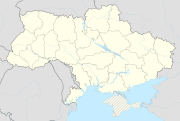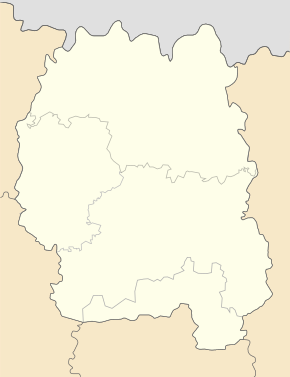Korosten
| Korosten | ||
| Коростень | ||

|
|
|
| Basic data | ||
|---|---|---|
| Oblast : | Zhytomyr Oblast | |
| Rajon : | District-free city | |
| Height : | 174 m | |
| Area : | 33.851 km² | |
| Residents : | 63,300 (2019) | |
| Population density : | 1,870 inhabitants per km² | |
| Postcodes : | 11500-11503 | |
| Area code : | +380 4142 | |
| Geographic location : | 50 ° 57 ' N , 28 ° 39' E | |
| KOATUU : | 1822300000 | |
| Administrative structure : | 1 city | |
| Mayor : | Volodymyr Moskalenko | |
| Address: | вул. Грушевського 22 11503 м. Коростень |
|
| Website : | http://www.korosten.osp.com.ua/ | |
| Statistical information | ||
|
|
||
Korosten ( Ukrainian and Russian Коростень ; Polish Korosteń ) is the center of the Rajon of the same name in the Zhytomyr Oblast in Ukraine . With around 63,000 inhabitants (2019), Korosten is the third largest city in the oblast.

geography
With an area of 3385.1 hectares, Korosten is the second largest city in the oblast after Zhytomyr. The city is located on the banks of the Ush, 87 km north of the Oblast capital Zhytomyr , 150 km west of the state capital Kiev and 60 km south of the Belarusian border .
Economy and Infrastructure
Korosten is an important traffic junction on the Kovel – Kiev and Kelmenzi – Kalinkawitschy railway lines . The M 21 trunk road runs through the city , and in the north of the city it crosses the Northern Railway ( European route 373 / M 07 ) that crosses Ukraine from east to west .
Valuable types of granite are extracted in the vicinity of the city . There is a porcelain factory in the city .
history
The city was probably founded in the 9th century on a granite hill and was then called Iskorosten . The name means 'walls with tree bark'. An alternative interpretation is from a Waragian, i.e. H. Swedish-Norman origin of the name from - í skárpsteina would therefore mean "on the pointed / rugged rock", which corresponds well with the location on the granite hill in an otherwise flat area. The village itself was probably founded by Drewljanen , only the name of the settlement goes back to Nordic roots and tradition; in the course of time he changed to Iskorosten among the Slavic speakers .
Iskorosten was first mentioned in a document in 914. At that time it was the capital of the Drewlyans , an East Slavic tribe. In 945, Princess Olga of Kiev had the city besieged, captured and burned in revenge for her husband Igor of Kiev , who had been killed by the Drewlyans . Iskorosten then belonged to the Kievan Rus .
In 1240 the city was conquered by the Mongols . From 1370 Iskorosten belonged to Lithuania , later to Poland . In 1589 it received city rights under Magdeburg law . 1649–1667 the city belonged to the Cossack state of Bohdan Khmelnyzkyj , after which it fell back to Poland. In 1795 the city came under Russian sovereignty. At that time it was a small provincial town.
In 1902 a railway station was built here and the city was renamed Korosten. On January 1, 1926, Korosten received city status. In the Second World War, after its capture by troops of the German Wehrmacht fairly well preserved city in July 1941 was the end of 1943 as part of its recapture by the Red Army largely razed.
In Korosten there was a prisoner of war camp 110 for German prisoners of war of the Second World War.
Korosten was badly hit by the Chernobyl accident in 1986 .
Population development

Source:
sons and daughters of the town
- Svetlana Nikolajewna Selesnjowa (* 1969), Soviet-Russian mathematician, computer scientist and university professor
Rajon
The Korosten Rajon, administered by Korosten and surrounding the city , was founded in 1926, has an area of 1,739 km² and 34,030 inhabitants. The population density is 20 inhabitants per km².
Web links
- Page about the city
- Local history of Korosten in the history of the cities and villages of the Ukrainian SSR (Ukrainian)
Individual evidence
- ↑ a b Population figures on pop-stat.mashke.org
- ^ Official website of the city of Korosten ; accessed on October 7, 2019 (Ukrainian)
- ↑ Gottfried Schramm: Old Russia's Beginnings . Rombach, Freiburg i. B. 2002, p. 208-215 .
- ↑ Erich Maschke (ed.): On the history of the German prisoners of war of the 2nd World War. Verlag Ernst and Werner Gieseking, Bielefeld 1962–1977.





